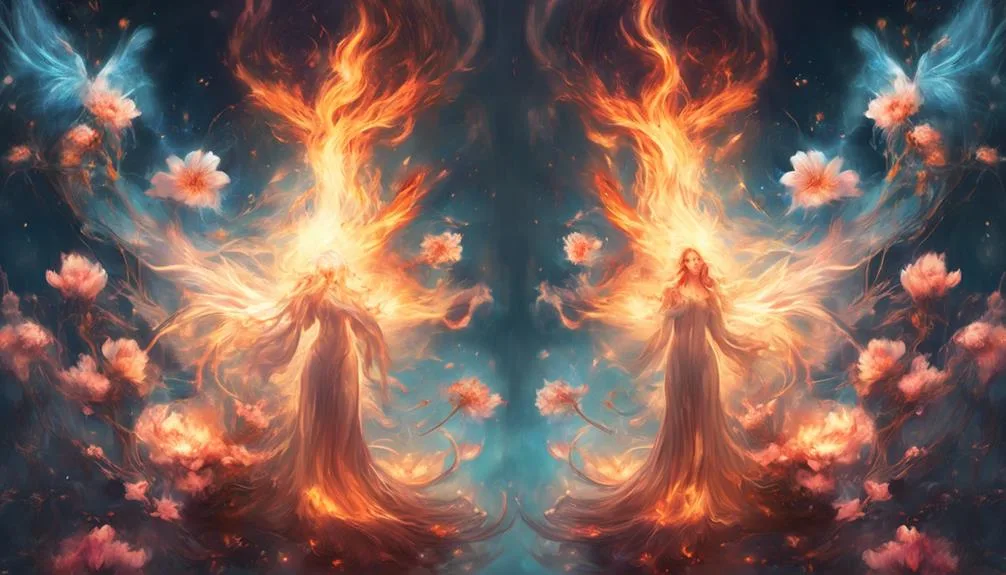The twin flame runner experience isn't just about avoiding a strong connection. It involves deep emotions, fear, and growth.
Many misunderstand why one partner might pull away, thinking it's a simple case of not wanting to be close.
This article will give you a better understanding of what's going on with the runner, looking at their feelings, fears of getting too close, and common myths.
We'll also touch on the growth opportunities for both partners.
Key Takeaways
- The twin flame runner experience involves one partner distancing themselves emotionally or physically due to fear, unresolved issues, or the need for personal growth.
- Understanding the runner's perspective can help reduce anxiety and bridge the distance in the twin flame relationship.
- Self-love is a crucial lesson learned during the twin flame runner experience, emphasizing the significance of loving oneself unconditionally.
- The twin flame runner experience highlights the importance of personal and shared growth, inspiring and mirroring each other's spiritual evolution.
Understanding the Runner Phenomenon

To grasp the runner phenomenon in twin flame relationships, it's essential to understand why one partner might suddenly pull away, despite a deep connection. This behavior, known as runner dynamics, often stems from a complex mix of fear, unhealed wounds, and a subconscious desire for spiritual growth.
You might think you're both on a path to deep, unconditional love, but then, unexpectedly, your partner hits the brakes. They're not just running from you—they're running from themselves and what the relationship mirrors about their deepest fears and insecurities.
Spiritual bypassing plays a significant role here, as the runner uses spiritual ideals as a shield to avoid facing painful truths or engaging in emotional healing. Understanding this can help you navigate the challenging waters of a twin flame relationship with more empathy and patience.
Common Emotions of the Runner

Amid the turmoil of running, you'll likely encounter a whirlwind of emotions, ranging from fear to a profound sense of loss. This journey isn't just about distance; it's an emotional rollercoaster that can leave you grappling with:
- Runner's guilt: This gnawing feeling stems from leaving your twin flame behind. It's a complex blend of regret and responsibility, making you question your actions repeatedly.
- Emotional confusion: As the days pass, your emotions might feel like a tangled web. One moment you're convinced running was necessary; the next, you're drowning in doubt.
- A longing for reconnection: Despite the chaos, a part of you yearns to return, to bridge the gap and heal the rift. This desire often battles with your fear, making the runner's experience profoundly challenging.
The Fear of Intimacy

One common reason you might find yourself running from your twin flame is a deep-seated fear of intimacy. This fear isn't superficial; it's intertwined with your attachment styles and past experiences that shape how you approach closeness.
If you've developed an avoidant attachment style, you're likely to find intimacy overwhelming, pushing you to create distance whenever things get too real. This is where communication barriers come into play. You might struggle to express your needs and feelings, fearing that vulnerability will lead to rejection or hurt. Consequently, instead of facing these fears, you run, believing it's safer to maintain your independence than to risk the potential pain that comes with deep connection.
Understanding and addressing these fears is crucial for overcoming the urge to flee.
Misconceptions About Running

Many people mistakenly believe that running from a twin flame is an act of fear or avoidance, when in reality, it often stems from deeper, unaddressed emotional issues. The runner stereotypes you've heard about aren't always accurate. Here's what's often overlooked:
- Avoidance Tactics: It's not just about dodging confrontation; it's about an internal struggle to confront personal demons.
- Deep Insecurities: Runners aren't always fleeing from you; they're running from parts of themselves they can't yet face.
- A Call for Help: Their departure isn't a rejection but a complex, subconscious signal for help and understanding.
Understanding these points can shift your perspective from blame to empathy, allowing a deeper connection despite the tumultuous journey of the twin flame experience.
The Catalyst for Running

Having explored the misconceptions about running, let's now examine what actually triggers the urge to flee in the twin flame journey.
Often, the catalyst for running isn't what you'd expect. It's deeply rooted in the runner's awakening—a moment of intense clarity or overwhelming realization about the connection and its implications. This awakening can lead to a profound spiritual disconnect, where the runner feels unprepared or unworthy of such a powerful bond.
It's not about a lack of love or connection; rather, it's the fear of what this deep intimacy entails. The runner faces their shadows, fears, and insecurities head-on, and the instinct to flee kicks in.
Understanding this can shed light on the complex dynamics of the twin flame journey.
Growth During Separation

During the separation phase, you'll likely experience significant personal growth, often emerging stronger and more self-aware. This period is crucial for both self discovery journeys and integrating healing practices into your daily life. The time apart from your twin flame isn't wasted; it's an invaluable opportunity to delve into who you truly are and what you desire from life.
Consider these transformative experiences:
- Solo Adventures: Exploring new hobbies or traveling alone can ignite a deeper understanding of your passions and fears.
- Mindfulness and Meditation: These practices ground you, fostering a sense of peace and clarity about your path forward.
- Therapy or Spiritual Guidance: Seeking professional help or spiritual counsel can unravel deep-seated issues, paving the way for healing and growth.
Embrace this time to flourish independently, paving a stronger foundation for any future reunion.
Runner's Regret and Realization

While you navigate the journey of separation, you may find yourself grappling with a mix of regret and sudden realizations about the bond you've temporarily left behind. This period often brings you face to face with the importance of relationship accountability.
You start to see how your actions and decisions have impacted not just your twin flame but also the trajectory of your joint path. It's a moment of profound personal healing, where understanding and accepting your part in the dynamics of your connection becomes crucial.
As you delve deeper into this introspection, you begin to appreciate the depth of your relationship, recognizing the growth it demands from you. This acknowledgment can be the first step towards reconciliation, driven by a newfound commitment to mutual growth and healing.
Reunion Possibilities

After navigating the complexities of separation and self-reflection, you might wonder if a reunion with your twin flame is within reach. Understanding the role of spiritual timing can't be overstated. It's not just about when you're ready, but when the universe deems it the perfect moment for your paths to converge again.
Here are three vivid scenarios that might unfold:
- Synchronicities Increase: You start noticing more meaningful coincidences that seem to guide you back to each other.
- Dream Communications: Dreams become a common ground for reconciliation strategies, offering insights and resolutions.
- Mutual Growth Recognition: Both of you recognize the growth that occurred during separation, making the idea of reunion not just a possibility but a probable outcome.
Supporting Your Twin Flame Runner

Understanding the potential for a reunion with your twin flame naturally leads to exploring how you can support them if they're the runner in the relationship. Adopting effective communication strategies is crucial.
Begin by actively listening to their concerns and fears without judgment. This shows you're a safe harbor for their vulnerabilities. Remember, it's about understanding the runner's perspective, not fixing them.
Encourage open dialogue but respect their need for space and time to process their emotions. Your patience and willingness to view the situation from their standpoint can significantly reduce their anxiety and possibly shorten the distance they feel compelled to maintain.
Ultimately, your support can foster a healthier environment for both of you, nurturing the possibility of a harmonious reunion.
Transformative Lessons Learned

Navigating the journey with your twin flame runner teaches invaluable lessons that can transform both your lives. This path isn't just about reuniting; it's a catalyst for personal awakening, urging you to confront and heal deep-seated issues rather than indulging in spiritual bypassing.
Here are three transformative insights you'll gain:
- Self-love is foundational. You'll learn the importance of loving yourself unconditionally, realizing that completeness comes from within, not from your twin flame.
- Communication transcends words. Discovering new depths to empathy, you'll find ways to connect beyond verbal exchanges, fostering a deeper understanding.
- Growth is personal and shared. You'll see that your evolution inspires your runner, and vice versa, proving that both of you're mirrors reflecting the work needed to ascend spiritually together.
Conclusion
Having explored the depths of the twin flame runner experience, it's clear that this journey isn't simply about avoiding love but is intricately linked with fear, misunderstanding, and a profound desire for personal development.
For those navigating this path, either as the runner or the partner, the importance of empathy, insight, and patience can't be overstated. This process is an opportunity for both individuals to grow and evolve, both separately and together.
Let's hold space for healing and eventual unity, recognizing that this journey contributes to both personal and shared growth.
What lessons can we carry forward from this experience to enrich our understanding of love and connection?










